Sara Ryan's Blog, page 3
January 16, 2016
The worst question you can ask a writer.
The worst question to ask a writer is not: “Where do you get your ideas?”
This is a clichéd question, yes. But precisely because it’s a cliché, we probably have a stock response. Even if we don’t, it’s fairly easy to come up with some kind of answer, whether flip or serious, about where our ideas come from. (“Overheard conversations, other books, music, art, strange objects seen on the street, the Internet.”)
The worst question to ask a writer is not: “How much money do you make?”
This is mostly an annoying question. If we’re not inclined to share our yearly profit-and-loss statements with the questioner, we can deflect it gracefully and with humor, e.g. “Not enough to quit my day job!” or “Wealth beyond the dreams of avarice.” Or, if we’re feeling feisty, with “How much money do you make?” But “How much money do you make?” is fundamentally an answerable question.
The worst question to ask a writer is not: “What are you working on?”
This can be a tricky question. We don’t always want to reveal too much about projects that don’t yet feel fully formed. We might have signed nondisclosure agreements. (Although if we have, we can give a very fancy, high-status-sounding answer: a slight smile, a shrug, and the acronym “NDA.”) We might worry that if we describe the project, the questioner won’t respond in a way that feels positive and we’ll start to doubt ourselves. But “What are you working on?” is also absolutely an answerable question.
The worst question to ask a writer is: “Are you still writing?”
It immediately gives the impression that the questioner thinks we might not be, that writing was a passing fancy for us, that perhaps we’ve decided instead to work on baking a perfect Victoria sponge, or squatting three hundred, or learning calligraphy — all of which, of course, are estimable and worthy activities, no shade to anyone engaging in any or all of the above.
But “Are you still writing?” is almost a “Have you stopped beating your wife?” question. It puts us immediately on the defensive. We could answer by listing off our most recent and forthcoming publications. But we might worry that we’ll come off sounding like we’re bragging, or that our most recent publications were too long ago, our forthcoming too far in the future, or that regardless, they somehow wouldn’t count in the eyes of the questioner (wrong genre, wrong audience, inadequate distribution, etc.) There’s also the point that the fact that the questioner is asking implies that they aren’t aware of said publications, which means that we haven’t done a good enough job getting the word out about them.
If we don’t have recent or upcoming publications, “Are you still writing?” adds insult to injury. We’re almost certainly already beating ourselves up about it, and now we feel like the questioner may actually be asking “You mean you haven’t given up the ridiculous idea that you’re a writer?”
We could answer by saying what we’re working on, but that’s not what the questioner asked. A simple “Yes!” feels too terse. We’d like to think the questioner means well, but again, if they are, why would they ask about our writing in a way that casts doubt on whether or not it’s still happening?
And if you’re reading this and thinking, “Geez, what’s the big deal? It’s a totally innocent question. Stop being so sensitive,” I might venture to wonder whether you’ve had many interactions with writers.
January 3, 2016
2016 is off to a good start.
I saw the excellent Alien She exhibit, a look at the impact & influence of Riot Grrrl, not once but twice. The first time my friend and I obeyed the sign that said no photography. When I came back with another friend, the person who took our coats & my backpack said “Don’t forget your cameras!” Hence the photos below.
My favorite part was discovering Allyson Mitchell‘s work. These first several images are from “Recommended Reading,” hand-drawn wallpaper of queer & feminist texts (and the occasional object, e.g. Hothead Paisan coffee mug), many familiar, several of which are on my own bookshelves. I think these drawings are also part of “A Girl’s Journey to the Well of Forbidden Knowledge.” Mitchell describes them on her website: “These laborious renderings pay homage not only to the Lesbian Herstory Archives, but to all feminist presses, bookstores and libraries that have worked valiantly to advocate for the significance of women’s stories, histories and acts of resistance, often in the face of sexism, homophobia and financial constraints.”
I’m fairly certain that commodification is not the point but am compelled to say that I would totally buy this as actual wallpaper.
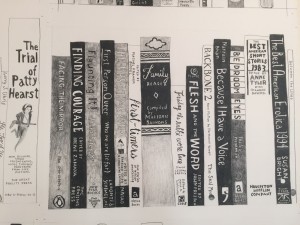
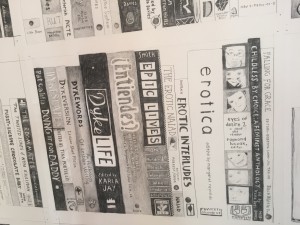
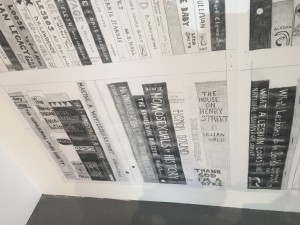
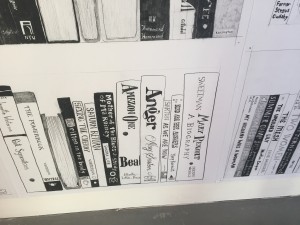
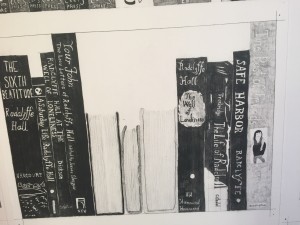
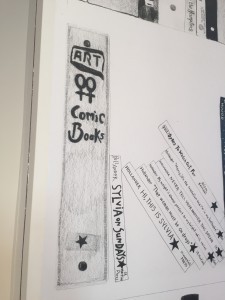
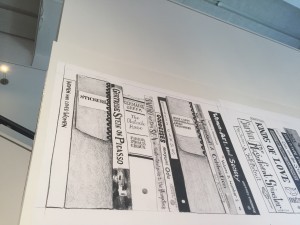
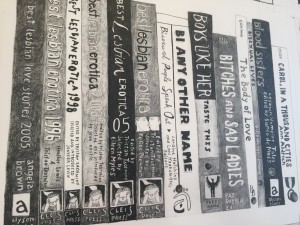
The exhibit also featured some of Mitchell’s Ladies Sasquatch and their small pink companions.
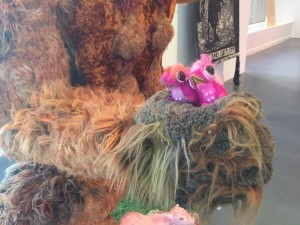



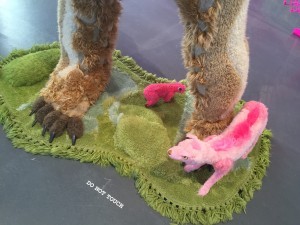
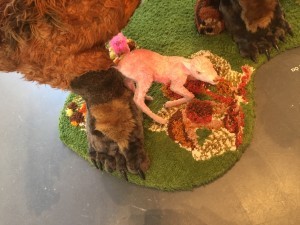
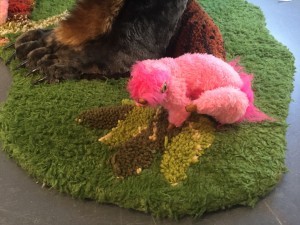
It’s only up until January 9th, so if you’re in Portland I recommend you get to it before it closes. I also quite liked the Big Miss Movieola/Joanie 4 Jackie videos and zines in the exhibit, though I simultaneously felt irritated at my past self for not knowing about the project while it was in its heyday. (I’ve never wanted to make movies, but the idea of getting video chainletters from women filmmakers sounds excellent.)
Other highlights of the year so far:
Finding an excellently warm and water repellent Irish coat at Rerun for twenty dollars, which became forty-four cents with my consignment credit…
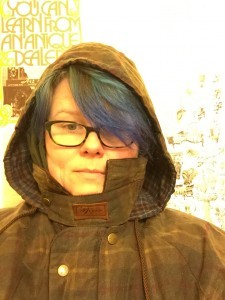
…right before the snow.

I got a special named after me at Handsome Pizza and I can report that it is extremely delicious:

And last but certainly not least I’ve been making my “Session Target” wordcount progress bar turn green in Scrivener. More like this, 2016.
December 28, 2015
Not really a year-end post
I didn’t feel like doing a regular end-of-year post, so instead, a few scattershot comments, punctuated by photos.
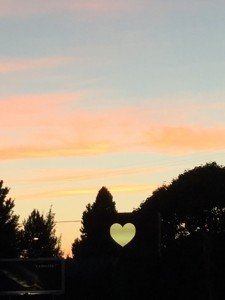
Thought a lot about communities this year. How to make spaces for people to connect, how to both contribute and listen, how to balance time between the people I mostly interact with via screen with the ones I see face-to-face. How to make the most out of the occasions when I get to see People From Inside the Computer in real life.

Also thought a lot about attention and to what and whom I was giving it. A slogan I heard on one of the many podcasts to which I have been listening keeps repeating in my head: “pay attention to your attention;” e.g.: the things you spend time pondering, obsessing, & ideally being delighted and enthusiastic about. Note that this is very different from “spend more time being anxious about your recurring anxieties”!
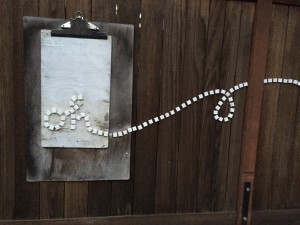
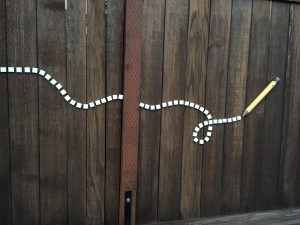
Speaking of enthusiasms, I don’t think I’ve mentioned here yet that I wrote an appreciation of T.H. White’s The Sword in the Stone for Hilobrow.
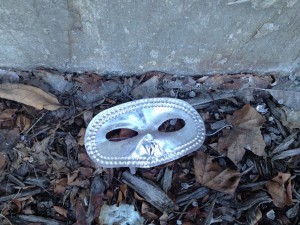
One of the books I really enjoyed this year was Boel Westin’s biography of Tove Jansson: Life, Art, Words. Always, it’s books that illuminate the difficulties as well as the satisfactions of doing creative work that I most appreciate.
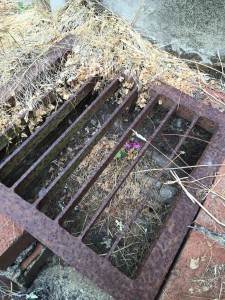
December 14, 2015
Some thoughts on QUILTBAG YA
Tess Sharpe was talking about the challenges she’s faced publishing queer YA. I have a compelling interest in the topic, so I Storified her tweets (go read them, I’ll wait). They struck me also because in some ways, her experience differs quite a bit from mine.
I’m hugely fortunate: I’ve never had to explain or justify queer content to agents or editors. Nor have I been asked to tone anything down or make anyone straight, and I’ve been at this for a while. That said, I’m certainly not a book-a-year author, and my tendency to write less explicitly than some readers might want has perhaps worked in my favor.
But despite my overall positive experiences, I absolutely agree there are challenges.
If you work with supportive agents and editors, you may still struggle with the publicity, marketing, and overall positioning of your work. Or maybe you’re happy with your relationship with your publisher, but find it hard to book the school visits and writing workshops that provide an income stream for many YA authors. (You may have noticed that I have not quit my day job.) I’d love to see more authors getting paid honoraria & travel to visit schools via Lambda Literary’s LGBT Writers in the Schools or similar programs.
Once your work is out there, I do think ebooks are changing some aspects of the game. If a reader is on their phone or other device, nobody can easily see what they’re reading. So if that reader doesn’t feel safe carrying a physical book with queer content, they can get an ebook or downloadable audiobook — both of which are also getting easier to check out from libraries — and no one has to know unless the reader wants to tell them. Even if a queer title vanishes quickly from bookstore shelves, it can also have a longer life in electronic form. (However, the questions of whether readers can easily discover the titles and who has access to the devices to read them on are also important to consider.)
In terms of reader desire for more queer YA, I’m very aware that at this point we have at least a couple generations of readers who’ve grown up with fanfic and self-publishing, both of which can cater to what readers want with a high degree of specificity, including but certainly not limited to queer content. If readers have had numerous opportunities to read (or write!) about their ideal POC genderfluid ace hero’s adventures, why would they want anything less from ‘mainstream’ publishing?
I don’t have any grand conclusions, except that I think it’s always important to share stories: it allows us to compare notes and strategize about how to advocate for ourselves, each other, and marginalized voices more generally.
December 7, 2015
File under: Future, living in the
I’d been in a meeting at a library, and at first I thought I must have left my phone on the table where we’d been talking.
Then I frantically dumped everything out of my bag, because more than once I’ve been convinced I lost it, only to discover the phone lurking coyly in my bag’s depths.
Checked under the table. Nope.
Maybe it fell out of my coat pocket between the building and my car?
Had I even had it with me when I left the house? But I knew I had, I’d been listening to a podcast.
Panicked.
Retraced all my steps again.
Nothing. Sinking sick feeling.
Then I heard: someone had just called the library, asking for me by name. They had my phone.
“How did you figure out whose phone it was?”
They asked Siri.
Now, I’ve always been deeply suspicious of Siri, and only ever activated it (or do I mean contacted her?) by mistake. At which point I would always get flustered, as though I’d just discovered that the room I was in was bugged, and deactivate it (dismiss her?) as quickly as possible.
But it turns out, if you happen to find an iPhone and you want to know who it belongs to, you can say “Siri, whose phone is this?” — even if the phone is locked — and if that person has associated their name with their phone, Siri will tell you.
(Yes yes, I’m certain this could be exploited for nefarious purposes, I’m sure there are extremely good reasons for naming your phone something utterly random and inexplicable and entirely unrelated to your name. But in this case I’m very glad I did not do that.)
“And then how did you know to call the library?”
Once they had my name they found this very website, or possibly my Twitter account, both of which mention that I’m a librarian as well as an author. They found the phone via running over it with their bike. So yes, it fell out of my coat pocket between the building and my car, and yes, I’m glad I have a very sturdy case.
The phone was near the library, so they put two and two together.
For which I am super super grateful. I did not get my rescuer’s name, but if you’re reading this, thank you again, you are a hero.
November 5, 2015
Going quiet
I want to write a bit here about taking a break from social media — which I’m doing through November at least. Maybe longer.
What I love about social media: feeling connected to distant friends. Being able to educate myself through listening to voices I wouldn’t otherwise encounter. A sense of being (relatively) well-informed, of being part of a conversation. And of course, adorable animal photos.
What I hate: time slipping away while I scroll. Anxiety mounting. Feeling as though I should do something about everything that’s wrong that people are talking about. Continuing to scroll instead.
It’s been just about a week sans Facebook and Twitter. It feels like my brain is rewiring itself a bit, and also like I’ve gone back in time.
And yes, it does seem to help with writing, which is the other reason for the break.
You can still reach me through the contact form here and email, I haven’t gone entirely offline. But. It’s quieter.
So far I like it.
October 4, 2015
October
It got to be October.
A lot has happened that I haven’t written about here.
I did a bunch of traveling. Here are a few worn surfaces I saw in Covington, Kentucky.



Also a couple of ominous panels from a civic installation.
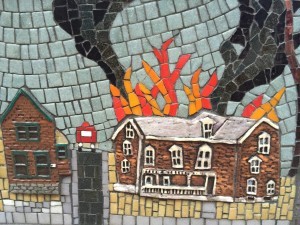
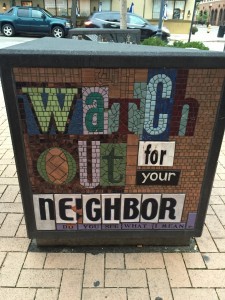
I joined a critique group. I helped start a learning community. I spent time at a site formerly occupied by a telegraph relay station and (later) a cult.
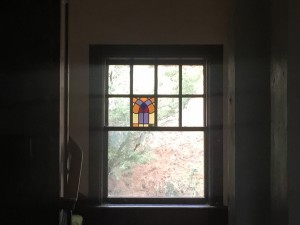
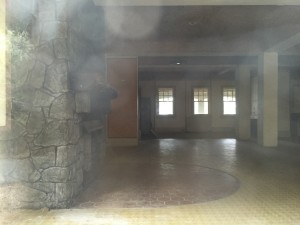

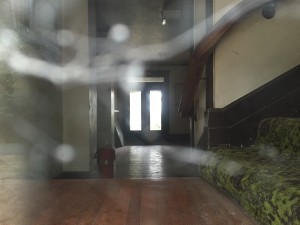
I’ve been sick, the kind of sick where you begin to suspect your immune system of going on strike so you’ll just, like, stop a minute.
Listening to Hamilton a ludicrous number of times, alternating with several different Mary Renault books; all rereads, via the audio versions. Marveling about how much of the violence and politics in Renault’s work my teen self elided over to get to the next description of a theatrical, musical, or poetry performance, and/or the next emotionally intense scene between Alexander and Hephaistion, or Alexander and Bagoas, as the case may be. (Yes, I’ve been listening to work about two historically significant Alexanders, both of whom had complex love lives.)
Today was the first day in a week or so that I’ve felt more or less like a human. Hoping you’re the same.
Unless you’d prefer to be a nonhuman entity of some variety; in which case, I hope you’re that.
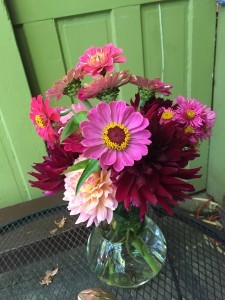
September 7, 2015
Lambda Literary Emerging Writers Retreat: a few reflections
Here’s a tweet from the week I taught the Genre Fiction workshop at the Lambda Literary Emerging Writers Retreat:

Apt that @LambdaLiterary retreat has taken place in a construction zone: lots of work, often loud, making new things.
It’s hard to overestimate the value of a specifically queer writers’ retreat (while recognizing that not everyone is a fan of the word queer). Despite the enormous variation in people’s individual experiences of sexuality and gender (and everything else), there was an overall sense of community and connection not simply within each individual workshop cohort, but among and across them all — poetry, nonfiction, fiction, playwriting, and the one I taught: genre fiction with a dual focus in comics and YA.
I really appreciated how a shared understanding of queerness informed the way people responded to each other’s work. When no one has to spend time explaining or justifying queer themes, characters, etc., it creates more room in a workshop to focus on other aspects of craft and storytelling.
As someone whose queerness can often be invisible, I also welcomed,well, being welcomed in a queer space.
And speaking of space, I’m certain that the sense of community I referred to above was significantly enhanced by the fact that we were all, faculty and Fellows, staying in the same dorm, which had a shared courtyard where many folks chose to gather in the afternoons & evenings. (Sometimes very late into the evenings…)
We had a faculty reading and Q&A the first night, on campus:
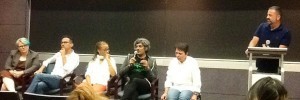
l-r: me, Justin Torres, Linda Villarosa, Kazim Ali with the mic, Cherríe Moraga, and Lambda Literary Executive Director Tony Valenzuela at the lectern. It was an enormous honor to share a stage with this group of people! (Also: I’m pretty sure this photo was taken at a serious moment, but I’m amused in retrospect by how the rest of us are all looking thoughtful in different ways as Kazim speaks.)
Oh and here I am, very professorial (the lectern helps, as does the jacket) while reading from Bad Houses:
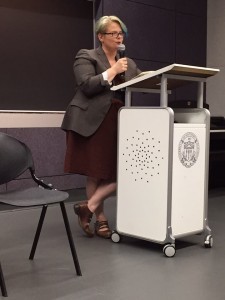
Besides the faculty reading, there were three nights’ worth of Fellows readings. We also got to hear from Amy Scholder and Ryka Aoki — these talks were ostensibly for the Fellows, but I think all the faculty attended each one, too.
You can watch the Fellows readings and I highly encourage you to do so. I think it’s so smart of Lambda to build public readings into the retreat. Not only is it great practice — a lot of writers don’t get many opportunities to do readings — but the presence of other Fellows and faculty makes for an incredibly enthusiastic audience response! (Said response may or may not include referring to and cheering for the various cohorts as Hogwarts houses; in 2015 the poets were Slytherin and the Genre folks were Hufflepuff.)
I’ll quote what Malinda Lo said in the post she wrote about teaching in 2013: “Even though I didn’t have my own writing workshopped at the retreat, I thought a lot about my writing too. I thought about what I owe to other queer readers, and what I owe to myself as a queer writer.”
It’s very easy for me to focus so hard on trying to solve problems in what I’m writing — and there are always problems — that I forget why I write in the first place.
Teaching at Lambda helped me remember.
I’m so grateful to Lambda for inviting me to teach, and to the terrific Genre Fellows whose talent, hard work, and mutual support made it such a pleasure. Here I am with them all:
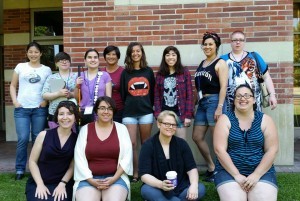
l-r: Top row: Karen Yin, Parker Goodreau, Caitlin Hernandez, Kate Goka, Isabel Galupo, Jasmine Molina, Sarah Jiménez, M-E Girard. Bottom row: Catherine Healy, Pam Watts, me, Meg Allen. Remember their names!
August 16, 2015
Book recommendations from the BGL retreat
As has become traditional (see 2014, 2013, 2012), here are some recommendations from folks at this year’s Barry Goldblatt Literary retreat. And even though the post is called book recommendations, there are also things that aren’t books.
I always enjoy finding the link for each thing; book trailers, author sites, publisher pages, reviews, interviews. One of the links below is to a glowing review that also contains adorable photos and a brownie recipe. (And now you’ll click them all, won’t you?)
In no particular order:
Yes Please, particularly the audiobook, by Amy Poehler
Young Elites, Marie Lu
Wolfie the Bunny by Ame Dyckman and Zachariah OHora
I Don’t Like Koala by Sean Ferrell and Charles Santoso
The Fantastic Jungles of Henri Rousseau by Michelle Markel and Amanda Hall
The Iridescence of Birds by Patricia MacLachlan and Hadley Hooper
Tricky Vic: the Impossibly True Story of the Man Who Sold the Eiffel Tower by Greg Pizzoli
Circus Mirandus by Cassie Beasley
Station 11 by Emily St. John Mandel
Armand Gamache mysteries by Louise Penny
The Walls Around Us by Nova Ren Suma
All the Rage by Courtney Summers
Bone Gap by Laura Ruby
Greenglass House by Kate Milford
Salvage by Alexandra Duncan
Glory O’Brien’s History of the Future by A.S. King
Uprooted by Naomi Novak
His Fair Assassin series by Robin LaFevers
The Thing About Jellyfish by Ali Benjamin
The Sixth Gun by Cullen Bunn and Brian Hurtt
Unbeatable Squirrel Girl by Ryan North and Erica Henderson
Nimona by Noelle Stevenson
Journey by Aaron Becker
Locomotive by Brian Floca
The Adventures of Luke Skywalker, Jedi Knight by Tony DiTerlizzi
Southern Reach trilogy [aka Area X] by Jeff VanderMeer
The Vorrh by Brian Catling
Saga by Brian K. Vaughan and Fiona Staples
Float by Daniel Miyares
Sidewalk Flowers by JonArno Lawson and Sydney Smith
The Bear Ate Your Sandwich by Julia Sarcone-Roach
Crazy Horse’s Girlfriend by Erika T. Wurth
Written in the Stars by Aisha Saeed
Counting Crows by Kathi Appelt & Rob Dunleavy
The Jumbies by Tracey Batiste
Roller Girl by Victoria Jamieson
El Deafo by Cece Bell
Elvis and the Underdogs by Jenny Lee
The Detective’s Assistant by Kate Hannigan
Unusual Chickens for the Exceptional Poultry Farmer by Kelly Jones
The Truth About Twinkie Pie by Kat Yeh
Boy, Snow, Bird by Helen Oyeyemi
The Carnival at Bray by Jessie Ann Foley
The Princess in Black by Shannon Hale, Dean Hale and LeUyen Pham
The Darkest Part of the Forest by Holly Black
Show and Prove by Sofia Quintero
Supermutant Magic Academy by Jillian Tamaki
Pretty Deadly by Kelly Sue DeConnick and Emma Rios
ODY-C by Matt Fraction and Christian Ward
Last Stop on Market Street by Matt de la Peña and Christian Robinson
The Princess and the Pony by Kate Beaton
Shadowshaper by Daniel José Older
Cuckoo Song by Frances Hardinge
The House of Shattered Wings by Aliette de Bodard
Courtney Barnett, “Pedestrian at Best”
The Girl With All the Gifts by M. R. Carey
Boots of Leather, Slippers of Gold: the history of a lesbian community by Elizabeth Lapovsky Kennedy and Madeline D. Davis
Art and Fear by David Bayles and Ted Orland
July 14, 2015
Resources mentioned at the SDCC Normalizing Publishing panel
First off, sharing a stage with Nilah Magruder, Nicola Yoon, Cindy Pon, and Greg van Eekhout for the Normalizing Publishing panel was absolutely a highlight of my time at the San Diego Comic-Con.
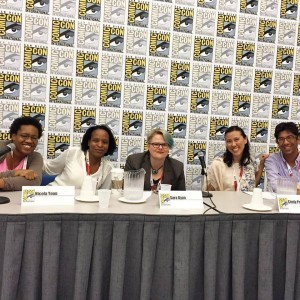
We managed to cover a lot in a short amount of time! Including but not limited to:
the importance of in-person as well as online communities for creators from marginalized groups
in framing the conversation about a book, comic, etc., how it’s equally important to highlight a work’s diverse qualities and to not relegate it to only being discussed in the context of those qualities
how alienating it is to grow up never seeing characters or creators who reflect your culture and experiences
how when you’re trying to create characters outside your own culture and experiences, research and respect are key
We also mentioned a lot of specific resources! Also including but not limited to:
We Need Diverse Books and its publishing internship program
The Publishing Diversity Baseline Survey spearheaded by Lee and Low Books, which also offers the New Voices and New Visions awards
The Carl Brandon Society and its Con Or Bust support for people of color to attend science fiction & fantasy conventions
Voices At VONA, a multigenre writing workshop for people of color
Lambda Literary Emerging LGBTQ Voices writers retreat
Writing The Other by Nisi Shawl and Cynthia Ward
Thanks to all who came to the panel, and I’m happy to update this post with more info & links I’ve forgotten in post-con exhaustion!



